May 20, 2025 | 09:15 GMT +7
May 20, 2025 | 09:15 GMT +7
Hotline: 0913.378.918
May 20, 2025 | 09:15 GMT +7
Hotline: 0913.378.918
In Yen Bai province, Bat Do bamboo has affirmed its effectiveness in economic development, hunger elimination, and poverty reduction for people in communes in the highland and ethnic minority areas. Along with great economic benefits, Bat Do bamboo also contributes to greening farming land and bare hills and mountains, improving the environment, and preventing erosion and landslides.
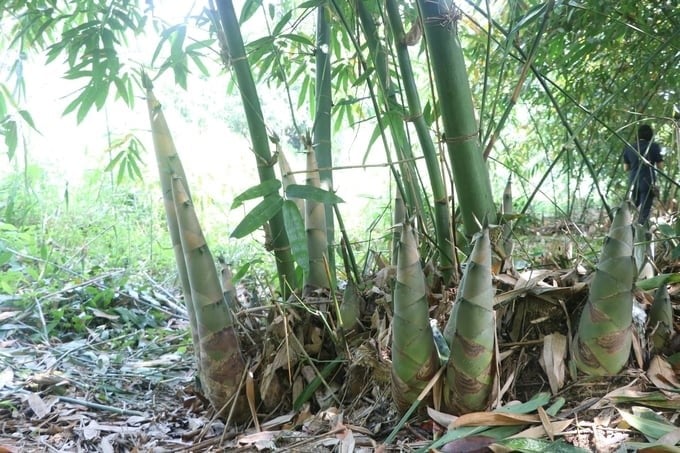
Tran Yen district has formed a Bat Do bamboo area of over 4,200 ha. Photo: Thanh Tien.
Two decades ago, Tran Yen district (Yen Bai) used to be a poor district; people's lives were extremely difficult. Especially in remote communes and communes where ethnic minorities live, the poverty rate was up to 50–70%. Deriving from China, after more than 20 years, Bat Do bamboo is gradually becoming familiar and bringing livelihoods to thousands of households in Tran Yen.
As of now, Tran Yen district has formed the largest Bat Do bamboo growing area in Vietnam, with a total area of over 4,200 ha, of which the business area yields a harvest of nearly 3,300 ha. The annual average output of commercial bamboo shoots reaches more than 30,000 tons. With the average purchasing price of bamboo shoots (fresh tubers) ranging from VND 5,700 to VND 6,000/kg, people have an income of over VND 50 million/ha, even VND 70–80 million/ha in high-intensive farming areas. In addition, bamboo also provides income from leaves, branches, and stems to make handicrafts, serve as raw materials for the paper industry, and make daily living utensils.
Ms. Tran Thi Hoan Lien, Director of the Tran Yen Support Services and Agricultural Development Center, said that currently, Tran Yen is focusing on developing and expanding the Bat Do bamboo area, building large-scale specialized production areas with linkages according to the value chain, and promoting the application of advanced scientific and technical advances in production.
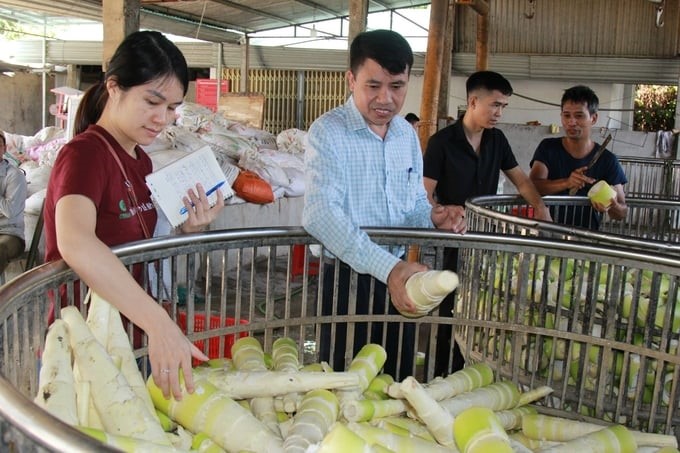
The price of Bat Do bamboo shoots always increases steadily, so people are excited to expand the area. Photo: Thanh Tien.
Kien Thanh (Tran Yen district) used to be a particularly difficult commune with over 90% ethnic minorities, including Dao, Tay, and Mong. However, thanks to Bat Do bamboo, Kien Thanh changes every day. This is currently a locality with a stable and high level of per capita income (over VND 50 million/person/year). Kien Thanh is considered the capital of Bat Do bamboo, with more than 2,000 ha, accounting for 50% of the entire district’s bamboo area.
Mr. Hoang Ngoc Chan, Vice Chairman of the Kien Thanh Commune People's Committee, said that along with cinnamon, Bat Do bamboo is the main crop of people in the commune. Every year, the commune's commercial bamboo shoot output always reaches approximately 20,000 tons, bringing an income of more than VND 100 billion. During the bamboo shoot season, some households earn several million dongs per day. Currently, in the commune, there are many businesses and cooperatives purchasing and processing products, so the consumption of people's bamboo shoots is very convenient.
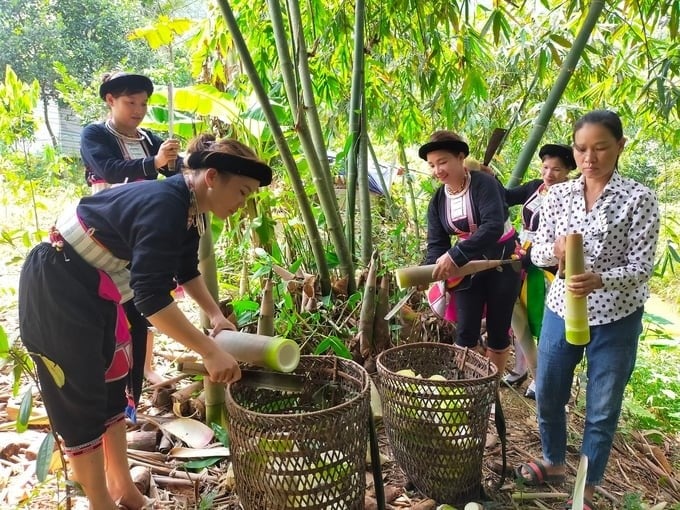
Every year, people in Kien Thanh commune (Tran Yen district) have an income of more than VND 100 billion from Bat Do bamboo shoots. Photo: Thanh Tien.
Hong Ca commune also used to be a particularly difficult area of Tran Yen district, with over 95% ethnic minorities, mainly Tay and Mong ethnic groups. As of now, approximately 70% of households in the commune have planted Bat Do bamboo, with a total area of nearly 1,300 ha, of which over 1,000 ha are in the business period. Especially in villages where the majority of Mong ethnic people live, such as Khe Ron, Khe Tien, Khuon Bo, Hong Lau, and Bat Do Bamboo, bamboo is gradually changing the people’s lives and production habits.
Previously, people here mainly worked in the fields with nomadic farming and life. The appearance of Bat Do bamboo has helped people stay in the village, no longer have to leave their homeland to work as hired laborers, and eliminate the situation of deforestation and slash-and-burn farming. The bare hills and mountains are gradually covered with bamboo. Each year, the commune's commercial bamboo shoot output reaches over 10,000 tons, worth nearly VND 60 billion.
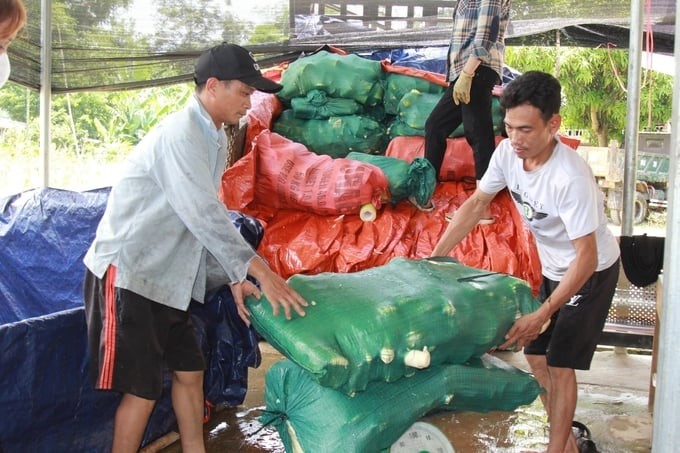
People’s Bat Do bamboo shoot products are purchased by businesses and cooperatives at stable prices. Photo: Thanh Tien.
Thanks to revenue from bamboo shoots, people in the commune have escaped poverty, and many households have become well-off. Furthermore, focusing on expanding the area here has contributed to limiting the situation of nomadic farming and life and deforestation for slash-and-burn farming.
In 2020, the Bat Do bamboo area of Tran Yen district was protected by the Intellectual Property Office of Viet Nam as a geographical indication. Currently, some communes in the district have developed bamboo shoot products that meet 3- or 4-star OCOP standards. Revenue from bamboo shoots, branches, leaves, and stems of Bat Do bamboo trees is a livelihood that helps thousands of households in the district eliminate hunger and reduce poverty. Bat Do bamboo is gradually becoming a tree to get wealthy.
Once struggling to find a way to consume bamboo shoots, Bat Do bamboo shoots in Tran Yen have now been purchased, processed, and expanded to export by a series of businesses, cooperatives, traders, etc.
Mr. Nguyen Kien Dinh, Director of Yamazaky Vietnam Co., Ltd., said that the company has a processing factory right in the raw material area, so the technical stages of growing, purchasing, processing, and exporting products are all supported and arranged with technical staff to monitor and standardize every smallest step for farmers by the company.
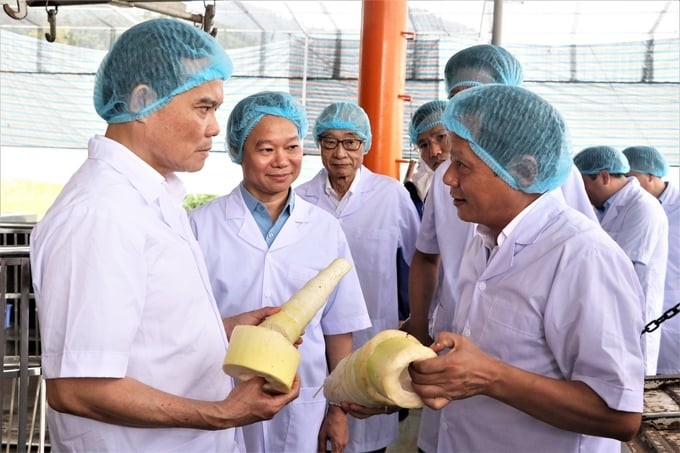
Deputy Prime Minister Tran Luu Quang visited the bamboo shoot purchasing and processing area of Yamazaky Vietnam Co., Ltd. in Tung Khanh commune, Tran Yen district, on August 10, 2023.
The deployment of purchasing bamboo shoots to each village and pre-processing them on the spot, as well as ensuring purchasing at market prices, has helped people for many years have a high, stable income so they can feel secure and focus on the stages of caring, intensive farming, and area expansion.
"It is expected that by 2025, our company will expand the processing factory and each year will purchase 5,000 tons or more of commercial bamboo shoots to process and export to the Japanese market," said Mr. Dinh.
Income from the Bat Do bamboo raw material area has contributed to building Tran Yen district to become the first new rural district of Yen Bai province in 2019 and is gradually striving to become an advanced new rural district by 2024.
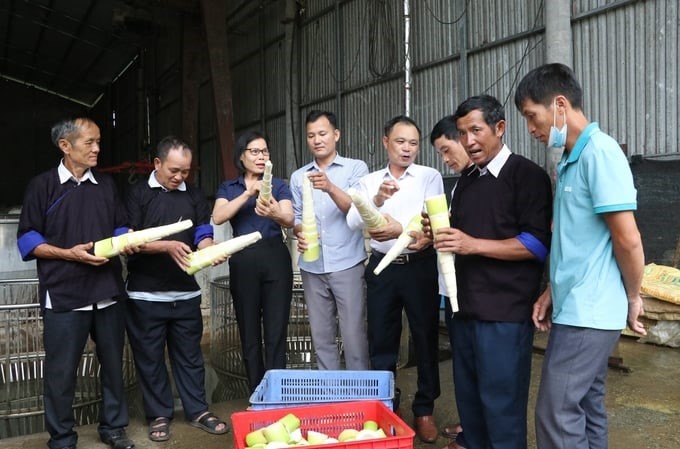
Bat Do bamboo has helped ethnic minorities in Tran Yen district rise to get rich. Photo: Thanh Tien.
Currently, the district's per capita income reaches VND 54.6 million/person/year, the poverty rate has decreased to 1.78%. The entire district has three communes meeting model new rural standards and 10 communes meeting advanced new rural standards. In addition, there are over 100 villages recognized as model new rural villages.
In the next period, Yen Bai province has a guideline for maintaining the Bat Do bamboo raw material area in Tran Yen while expanding the area in other districts such as Van Chan, Yen Binh, Tram Tau, and Mu Cang Chai to maximize the economic and environmental effectiveness of this useful and friendly crop.
Bat Do bamboo has formed a complete production linkage chain, including raw material areas, cooperatives, and businesses. In the 2023 Bat Do bamboo shoot crop, Tran Yen district's output is expected to reach 32,500 tons of commercial bamboo shoots, with the entire district’s income value estimated at approximately VND 200 billion.
Currently, businesses such as Van Dat Co., Ltd., Yen Thanh JSC, and Yamazaky Vietnam Co., Ltd. have linked with cooperatives to purchase bamboo shoots for people. In addition, many private traders in the provinces of Phu Tho, Hai Duong, Tuyen Quang, Bac Kan, etc. have come to buy bamboo shoots, boiled bamboo shoots, fresh bamboo shoots, and pre-processed dried bamboo shoots. Bamboo shoot products, after being pre-processed and processed, are exported to demanding markets such as Taiwan, Japan, etc.
Translated by Huyen Vu Thu

(VAN) Khanh Hoa is investing over 545 billion VND to develop 240 hectares of high-tech marine aquaculture in order to guarantee a consistent supply of seafood exports and achieve the USD 1 billion target.

(VAN) Minister of Agriculture and Environment Do Duc Duy held a meeting with Soopakij Chearavanont, Chairman of C.P. Group, on May 15.
/2025/05/16/3800-0-nongnghiep-143756.jpg)
(VAN) Suntory PepsiCo Vietnam coordinated with the Ministry of Education and Training to implement an education program on water conservation, reaching nearly 1 million primary school students nationwide.

(VAN) Vietnam’s TH Group officially put its high-tech fresh milk processing plant into operation in the Russian Federation, marking a historic moment as the first TH true MILK cartons were produced in Russia.

(VAN) Use of high-quality broodstock and biotechnology is regarded as the most effective approach to ensuring sustainable and economically viable shrimp aquaculture ahead of climate change and the emergence of increasingly intricate disease patterns.

(VAN) Carbon farming is a form of agricultural practices that helps absorb more greenhouse gases than it emits, through smart management of soil, crops, and livestock.

(VAN) This is a key content of the Memorandum of Understanding recently signed between the Vietnam Fisheries Society and Kunihiro Inc of Japan.